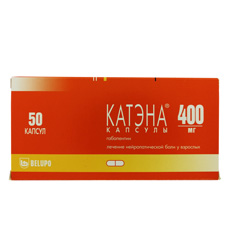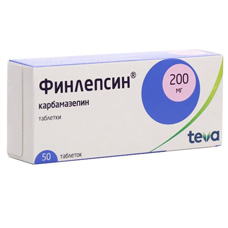
Sazar
Sazar is antiepileptic tablets used in the treatment of epilepsy and bipolar disorders; also has normothymic activity. Manufactured by Alkaloid AD Skopje (Macedonia)
Pharmachologic effect:
antiepilepticPharmacodynamics:
Lamotrigine is a voltage-gated sodium channel blocker. It reduces the pathological activity of neurons without inhibiting their function, stabilizes neuronal membranes by influencing Na + channels, blocks excessive release of glutamate without reducing its normal release.Pharmacokinetics:
Lamotrigine is rapidly and completely absorbed from the intestine with little or no first pass metabolism.
Cmax in plasma is reached approximately 2.5 hours after oral administration of the drug. Tmax slightly increases after a meal, but the degree of absorption remains unchanged.
Pharmacokinetics is linear with single doses up to 450 mg (highest dose studied). There are significant inter-individual fluctuations in Cmax in the equilibrium state, however, with rare fluctuations in each individual.
The enzyme uridine diphosphate glucuronyl transferase (UDP-glucuronyl transferase) is involved in the metabolism of lamotrigine. Lamotrigine slightly increases its own metabolism in a dose dependent manner. However, there is no evidence that lamotrigine affects the pharmacokinetics of other antiepileptic drugs and interactions between Sazar and other drugs metabolized by the cytochrome P450 system are possible.
In healthy adults, the steady-state clearance of lamotrigine is on average (39±14) ml/min.
The T1/2 of lamotrigine is greatly influenced by co-administered drugs.
The average T1/2 decreases to approximately 14 hours when co-administered with drugs that stimulate glucuronidation, such as carbamazepine and phenytoin, and increases to an average of 70 hours when co-administered with valproic acid.
Indications:
Epilepsy: Adults and children (over 12 years of age): epilepsy (partial and generalized seizures, including tonic-clonic seizures, as well as seizures in Lennox-Gastaut syndrome) as part of combination therapy or monotherapy.
Children aged 3 to 12 years: epilepsy (partial and generalized seizures, including tonic-clonic seizures, as well as seizures in Lennox-Gastaut syndrome) as part of combination therapy. Once epilepsy is controlled with combination therapy, concomitant antiepileptic drugs (AEDs) may be discontinued and Sazar continued as monotherapy; monotherapy of typical absences;
Bipolar Disorders: Adults (18 years and older): to prevent mood disorders (depression, mania, hypomania, mixed episodes) in patients with bipolar disorder.
Contraindications:
hypersensitivity to lamotrigine; children's age up to 3 years (for this dosage form).Use with caution:
chronic renal failure, allergic reactions or skin rash caused by taking other antiepileptic drugs.Side effects:
Information on side effects is divided into two sections: side effects in patients with epilepsy and side effects in patients with bipolar disorder. However, when considering the safety profile of Sazar as a whole, the information in both sections should be taken into account.
Epilepsy :
Often: skin rash, irritability, headache, drowsiness, insomnia, dizziness, tremor, nausea, diarrhea, diplopia, blurred vision;
Not often : aggressiveness, ataxia,
Rare : Stevens-Johnson syndrome, conjunctivitis
Very rare : toxic epidermal necrolysis, hematological disorders, hypersensitivity syndrome, tics, hallucinations, confusion, agitation, unsteadiness, movement disorders, worsening of Parkinson's symptoms, extrapyramidal disorders, choreoathetosis, increased frequency of seizures, elevated liver enzymes, abnormal liver function, liver failure Lupus-like syndrome.
Bipolar disorder:
Often : skin rash, headache, agitation, drowsiness, dizziness, arthralgia, back pain
Rare : Stevens-Johnson Syndrome
Interaction:
Valproic acid, which inhibits the glucuronization of lamotrigine, reduces the rate of its metabolism and lengthens its average T1/2 by almost 2 times. Certain AEDs (such as phenytoin, carbamazepine, phenobarbital, and primidone), which stimulate the liver metabolizing enzyme system, accelerate lamotrigine glucuronidation and metabolism.
Taking combined oral contraceptives containing 30 mcg of ethinyl estradiol and 150 mcg of levonorgestrel causes an approximately twofold increase in the clearance of lamotrigine (after oral administration), which leads to a decrease in AUC and Cmax of lamotrigine by an average of 52 and 39%, respectively. During the week free from taking the active drug, there is an increase in the plasma concentration of lamotrigine, while the concentration of lamotrigine, measured at the end of this week before the next dose, is on average 2 times higher than during the period of active therapy.
Rifampicin increases the clearance of lamotrigine and reduces its T1/2 due to the stimulation of hepatic enzymes responsible for glucuronidation.
Myelotoxic drugs increase the manifestations of hematotoxicity of the drug.
Dosing and Administration:
Please see PDF leaflet
Sazar
in Cyrillic : Сейзар
SUBSTANCE
Lamotridgine
DOSAGE FORM
tablets
Out Of Stock
Related Products
Finlepsin®
[ Carbamazepine ]
Antiepileptic pills, which also have antidepressant, antipsychotic and antidiuretic effects.
Out Of Stock



